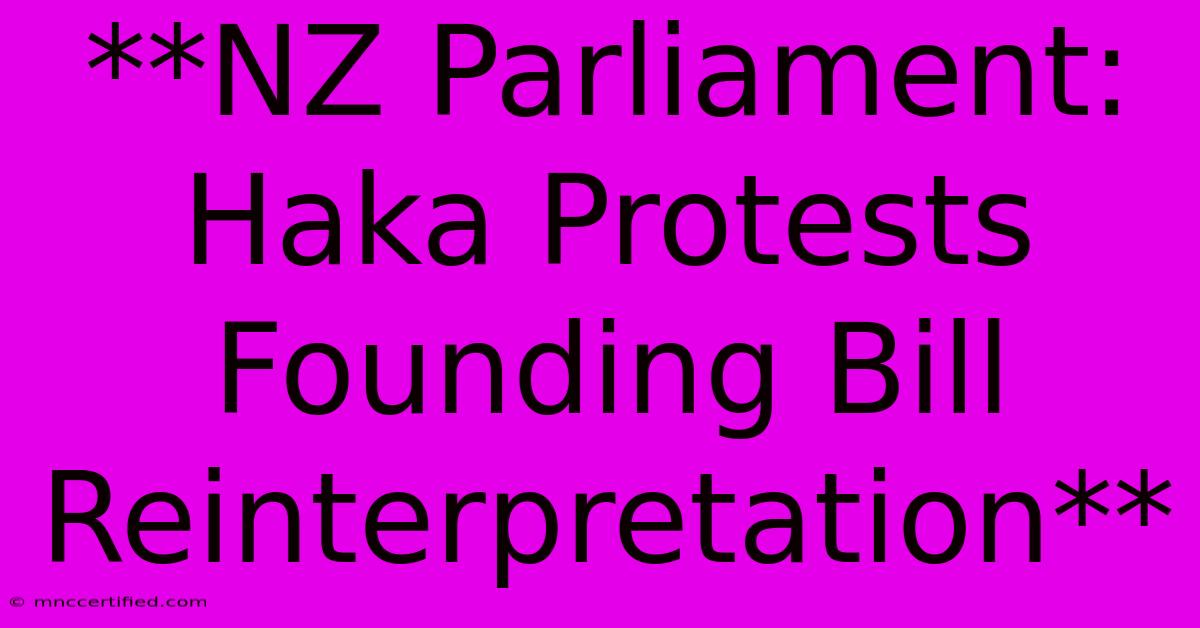**NZ Parliament: Haka Protests Founding Bill Reinterpretation**

Table of Contents
NZ Parliament: Haka Protests Founding Bill Reinterpretation
The New Zealand Parliament has recently sparked controversy with its reinterpretation of the founding bill regarding the haka performed by the Māori people. This move has ignited debate about cultural sensitivity, freedom of expression, and the historical context of the haka.
The Original Bill and its Context
The founding bill, passed in 1840, established the Treaty of Waitangi, a pivotal document in New Zealand's history. This treaty acknowledged Māori sovereignty and laid the groundwork for British colonization. The original bill, according to historical records, stipulated that the haka could only be performed by Māori individuals, primarily for ceremonial purposes.
The Recent Reinterpretation: A Move Towards Inclusion?
The Parliament's decision to reinterpret the bill has been met with mixed reactions. Supporters argue that this move promotes inclusivity and recognition of the evolving nature of cultural practices. They emphasize the symbolic significance of the haka, which extends beyond its traditional Māori roots, and believe that its performance by non-Māori individuals contributes to a broader understanding of New Zealand's multicultural identity.
Critics Raise Concerns: Cultural Appropriation or Respectful Tribute?
Critics, however, argue that the reinterpretation constitutes cultural appropriation and disrespects the historical and cultural significance of the haka. They point out that the haka holds deep spiritual meaning for Māori people and that allowing non-Māori individuals to perform it diminishes its cultural value. They fear that this move could lead to the commercialization and trivialization of the haka.
Navigating Cultural Sensitivities: A Difficult Balance
The debate highlights the complexities of navigating cultural sensitivities in a multicultural society. It raises critical questions about the balance between respecting traditional practices and promoting inclusivity. Finding a solution that respects the cultural heritage of the Māori people while also fostering a shared national identity remains a significant challenge.
Moving Forward: Dialogue and Understanding
The reinterpretation of the founding bill serves as a reminder of the ongoing conversation surrounding cultural representation and inclusivity. It emphasizes the need for dialogue and understanding between different cultural groups. Open communication and collaboration are essential to ensure that cultural practices are honored and celebrated in a respectful and meaningful way.
Beyond the Haka: A Broader Context
The debate surrounding the haka is a microcosm of larger issues regarding cultural appropriation and the preservation of cultural heritage. It encourages a broader conversation about how societies can navigate cultural differences while promoting inclusivity and respect for diverse traditions.
Conclusion
The reinterpretation of the founding bill regarding the haka is a complex issue with no easy solutions. It requires nuanced discussions, critical engagement with historical contexts, and respect for diverse perspectives. By fostering open dialogue and understanding, New Zealand can move towards a more inclusive society that values its rich cultural heritage while embracing its multicultural identity.

Thank you for visiting our website wich cover about **NZ Parliament: Haka Protests Founding Bill Reinterpretation**. We hope the information provided has been useful to you. Feel free to contact us if you have any questions or need further assistance. See you next time and dont miss to bookmark.
Featured Posts
-
Messis Paraguay Record Analysis And Impact
Nov 15, 2024
-
Braintrust Crypto Price Prediction
Nov 15, 2024
-
Circuits Of Value Price Prediction
Nov 15, 2024
-
Maturin Venezuela And Brazil Share Points
Nov 15, 2024
-
Taurus Full Moon November 2024 Astrological Impact
Nov 15, 2024